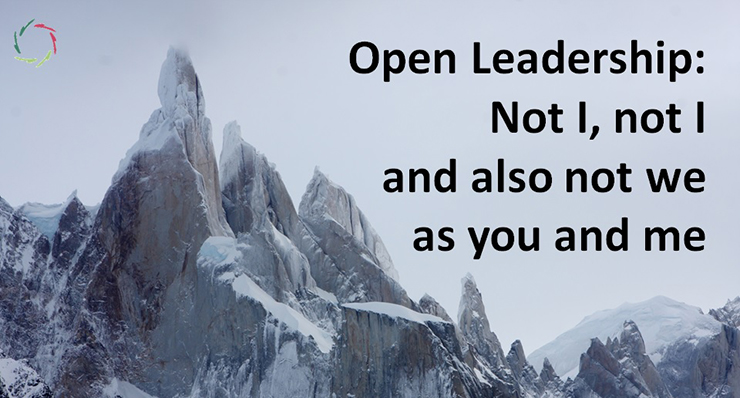Ethical Leadership is Open

Openness to the full human being is the one characteristic that makes leadership transcend management or bossiness. It is ethical to the core.
Full human being
At any time, an individual is consciously aware of a tiny part of what meaningfully goes on in his mind/brain at the mental-neuronal pattern level. Meanwhile, the other – immensely huge – part is continually active in influencing the conscious bit and itself as a full human being.
It is pragmatically infeasible for the individual to be consciously aware at any time of much more than what is usually the case. Conscious awareness is more like a laser beam of focused attention than a torch shining in all directions. The latter would enlighten the entire mental landscape, albeit slightly. Some parts of this mental landscape are easily focused upon, while others are less so. These are forgotten memories and things that may have never had the honor of getting focused attention.
Nevertheless, this full human being – with conscious and non-conscious processing – is the rightful object of any ethical stance, thus of ethical leadership. The term ‘Open’ with capital points to openness at this level.
Therefore, ethical leadership is Open ― in a Compassionate way.
Beyond situational
Situational leadership is about taking on a different stance as the situation demands. This is ethical to a certain degree. The reality, however, is not to be categorized without losing its crucial feature of being a flow.
The categories – distinct situations – may be like the boulders in a stream. It is practical to hop from one to the other and get somewhere.
But they are not the stream itself. The boulders may be practical, but following the stream may ask for more. Note that the boulders are part of, but not the entire stream. There’s much more to it.
The ethical leader as a full human being.
Following the course of the stream is ethical because it respects the entire stream. It also respects the stream’s energy, which can be used most naturally to accomplish things.
This is a simple image but people are complex beings, making ethical leadership a complex endeavor. This is why great leaders – like Gandhi and Mandela – are ‘great’ not only in their leadership but also as human beings. They are not bigger than life. They are life itself.
Life!
This is a huge challenge, about which you can find much in Open Leadership. The main challenge probably lies in taking care of more than what is directly, consciously, conceptually accessible. It is challenging because it asks to go beyond the mere-ego in others as well as, to start with, oneself ― deceptively simple, at the same time one of the hardest things to accomplish.
Precisely through their not-knowing, many people deem themselves experts in knowing.
One cannot lead a river without becoming that river. The level of in-depth interaction needed to accomplish this is hard to fathom from afar. Fortunately, the river gives lots of support to the ethical leader who, in Openness, may gratefully accept this support.
Giving people the occasion to live life to the full is the ethical aim of leadership.
This is about human, deeply personal growth, leading to meaningfulness. Growth as a company, or even in GDP, makes no sense if it doesn’t lead to human growth. This mistake is frequently made.
Another mistake is the thought that a company’s growth and human growth are necessarily antagonistic. More and more, probably enhanced by the COVID experience, the insight comes to many that this antagonism should be overcome. Let’s strive for continuation in the post-COVID era. This should not be taken for granted ― quite the contrary!
Precisely this is what ethical, Open leadership is about: to guide and support people in bringing together outside growth – a strong company – and inner, personal growth. The former is needed to accomplish things while eventually, the latter is what needs to be accomplished. In Openness, both are crucial and mutually reinforcing.
Opening people to their deepest motivation.
This makes ethical leadership also the most efficient one. In all relevant surveys, ‘growth’ comes to the fore as what motivates most people to the highest degree in their job. On the other side, lacking a sense of growth is a significant cause of negative stress and burnout on the work floor.
Herein lies the primary responsibility – ethically and organizationally – of leadership.
Ethical leadership lets it all flow together.
Leading any company to Openness doesn’t diminish competition. As with any other Opening, it ethically Opens competition.
Within the river metaphor, all rivers have the same aim: the vast ocean. There is no competition between rivers to get to the ocean, except in Openness. They may flow into each other and form bigger rivers, naturally, spontaneously.
Applying the metaphor to the human case, this spontaneity is ethical. More to the point, it is spontaneous because it is ethical, oriented to the full human individual who is basically un-divided by self-defeating inner tensions.
Never-ending story
Situations continually change. Human beings continually change. Even humanity continually changes.
An ethically Open stance in dealing with this, continually being Open to changes, is most durable.
We need ethical leadership at all levels to make this happen.


